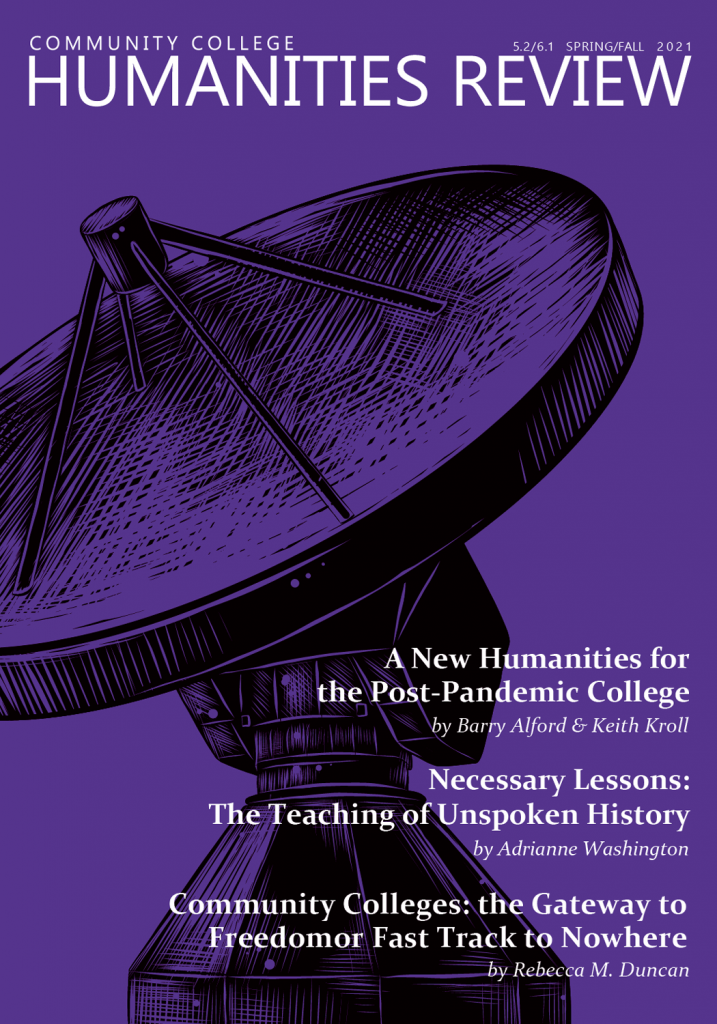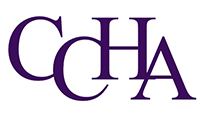Members, read your FREE digital copy of the CCHR

As a CCHA member, you have free access to the Community College Humanities Review (CCHR) journal. This can be accessed by using the link to the entire journal shared via OneDrive by clicking the link below.
If you prefer the tactile experience of reading a paper copy of the CCHR journal, the print publication is available for purchase through Amazon via the link below.
If you are interested in submitting material to future publications of the CCHR journal or if you just have general questions about the journal, you can read about the submission process and contact our Editor, Sydney Elliott, by using the link below.
CCHR Information
Contact Information
Sydney Elliott, Editor
sydneyelliott@tillamookbaycc.edu
Submission Information
Community College
HUMANITIES REVIEW
The Community College Humanities Review is published by the Community College Humanities Association (CCHA). The goal of the journal is to highlight the scholarly and creative work of community college humanities faculty. The editor encourages progressive approaches to writing about the humanities in community colleges, welcoming but also questioning conventional subject matter while inviting community college humanities faculty to take a fresh look at, for example, culture, the environment, the politics of food, climate change, genetic engineering, whatever new challenges a humanities mindset may help, in an integrated approach with other disciplines, to solve. The Community College Humanities Review strives to be the go to publication for community college humanities scholarship and creativity.
Submission Guidelines
Writing
Please query CCHR’s editor, Sydney Elliott, at sydneyelliott@tillamookbaycc.edu. Submissions will only be accepted through email in MS Word, 12 point, Times New Roman font, double spaced, left justified, with one-inch margins and page numbers in the upper right corner. There should be no headers or footers. CCHR rarely accepts any work over 7,000 words. Most texts should fall between the 2,000 – 7,000 word range. For additional format requirements concerning research submissions, see below.
Research
CCHR accepts well-researched articles by community college humanities faculty. Along with the above writing guidelines, scholar writers should follow MLA format and use endnotes (not footnotes) when necessary. Please restrict the number of explanatory or digressive endnotes that are excessively long. Limit the total number of endnotes to bibliographic references. Use superscript Arabic numbers in text, avoid the use of other symbols like asterisks. Embed tables, figures, charts, graphs into the narrative as close to the in-text reference as possible. Limit the number of appendixes.
Creative Nonfiction
Essays – CCHR accepts well-written personal experience and critical essays as well as long-form, literary journalism written by community college humanities faculty. Essays on novel pedagogy and teaching experiences are encouraged.
Profiles – Creative profiles in the long-form tradition should focus on community college humanities faculty or those who are in some significant way associated with community colleges.
Interviews
Interviews, in Q&A format, will be accepted as long as the interview subject has particular relevance to the teaching of humanities in community colleges. Please query Editor Sydney Elliott.
Fiction
CCHR accepts well written short stories of any genre, generally 1,000 to 7,500 words. Higher consideration is given to quality writing and the ability to tell a good story. Both character- or plot-driven stories welcome for review. CCHR publishes one short story per issue, more depending on the discretion of the editor. Send your best work. No previously published material. Yes on simultaneous submissions.
Poetry
Poets may submit up to five poems in any form. Publication design guidelines prohibit the guarantee of poet-designated line breaks. We’ll do our best to accommodate. Thoughtful, imaginative poems should resonate. Send your very best work. No previously published material. Simultaneous submissions are ok.
Photography
Subject to the editor’s discretion, The Community College Humanities Review accepts photography by community college humanities faculty. Photos may need to be conducive to the thematic content of a particular issue.
